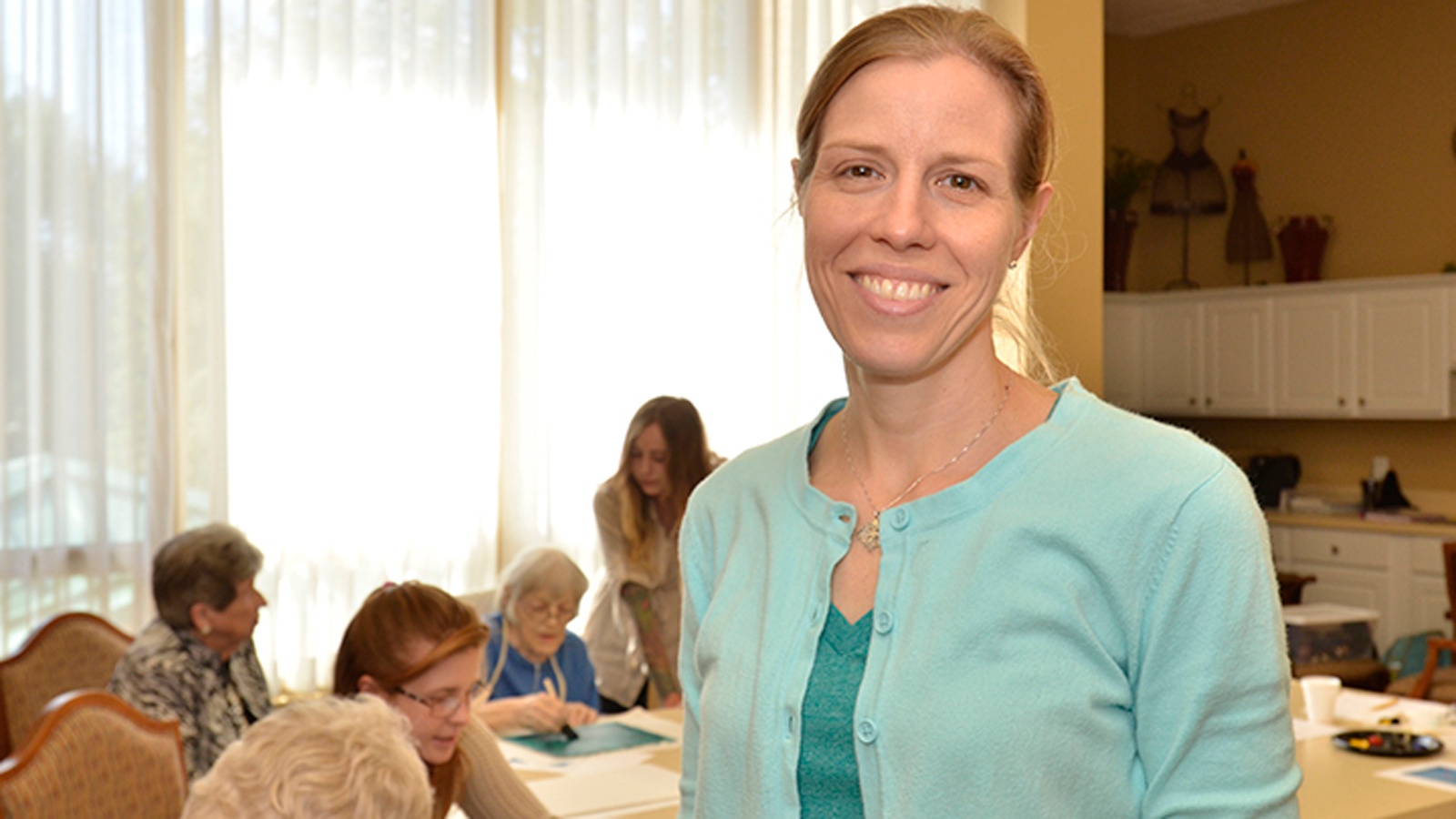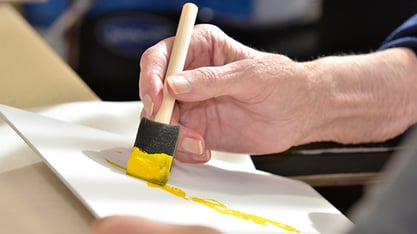
Marjorie P. Lee's certified art therapist, Janet Kempf, helped develop the art therapy program.
In memory care, there are many paths to treatment. What works well to alleviate Alzheimer's symptoms in one person may not work in another, so often the best approach is to throw some proverbial paint at the canvas and see what's effective.
And, here at Marjorie P. Lee in Cincinnati, we’re literally putting paint to canvas with an art therapy program that has long been shown to help generate memories, encourage sharing, increase empathy, decrease anxiety and improve the quality of life of some dementia and post-stroke patients.
In 2016, in cooperation with University of Cincinnati—Clermont College, psychology professor Dr. Meera Rastogi, MPL's certified art therapist, and Janet Kempf, developed a new, semester-long art therapy program, led by student interns. Dr. Rastogi and Kempf both hold national art therapy registrations and board certifications.
The intergenerational program has helped MPL residents, while also serving as a critical training ground for emerging art therapists under Dr. Rastogi and Ms. Kempf's instruction. The class is described as pre-art therapy internship, since a master’s degree is required to practice art therapy.
Seniors and students, helping each other
Nine Marjorie P. Lee residents participated in the program during the second operational semester.
Each senior was paired with an undergraduate student, who guided them through a variety of exercises. They included learning about art history, contemplating other artists' pieces and using them as inspiration for developing concepts, receiving instruction on painting technique, color mixing and the act of painting itself. Participating painters displayed their work in a gallery show at MPL in the event center.
The resident artists aren't the only ones benefiting from the program: the students are, too. They're developing their instructional and interpersonal skills to become more effective art therapists after graduation.
“The art therapy program at Marjorie P. Lee has enabled some very meaningful lessons and experiences that I will carry with me for the rest of my life,” said former intern Emma Roberts. “I have learned the power of art as a tool for communication, expression, and empathy when verbal language is hindered. Most importantly, through these art sessions I have witnessed and experienced profound connections between residents, interns, and teachers. These connections have greatly enriched my life, and I believe, the lives of the others. They have led to truly meaningful friendships and experiences.”
“The art therapy program at Marjorie P. Lee has enabled some very meaningful lessons and experiences that I will carry with me for the rest of my life,” said former intern Emma Roberts. “I have learned the power of art as a tool for communication, expression, and empathy when verbal language is hindered. Most importantly, through these art sessions I have witnessed and experienced profound connections between residents, interns, and teachers. These connections have greatly enriched my life and I believe the lives of the others. They have led to truly meaningful friendships and experiences.”
Former graduate intern Charlotte Reed, a master’s level art therapy student at St. Mary of the Wood College in Indiana, also said the program was a “wonderful experience” and shared this memory:
“One of my favorite units involved talking about Faith Ringgold, a famous fiber artist, and having the clients create their own story quilts. Each participant had a different connection with the tactile materials and were able to recall wonderful stories from their past. I worked with a woman who was uncertain about her skills as an artist, but through the mindfully prepared directions and choice of materials and techniques, she often ended sessions with a smile on her face and plenty of things to say about the group’s completed artwork.”

Lorelai Berry, who served as MPL resident Marcella Hamner's student art instructor, credited the program with having solidified her resolve to become a professional art therapist.
“Doing art with Marcella is the highlight of my week," she wrote in the spring of 2016, in her intern statement that accompanied the first gallery show.
"Anyone who is unsure of what to do with their life should spend six months working [here]," Berry proffered. "You will learn so much.”
University of Cincinnati student Lori Burkhardt agreed. She said that her experience as a student instructor was "a great opportunity to apply what we're learning about in a classroom."
Can visual art therapy cure cognitive disorders or memory loss?
No. As far as is yet known, nothing can cure dementia or permanently arrest Alzheimer's-associated memory loss.
But visual art therapy — along with music therapy, game-based therapies like SAIDO Learning, digital learning therapies like iN2L and other treatment options — can improve quality of life and increase empathy among those with Alzheimer’s dementia.
They can also be used in tandem with rigorous physical and occupational rehabilitation therapies to help post-stroke and post-neurological trauma patients recover some or all of their cognitive functions.
Such therapies focus on engaging the brain's natural neuroplasticity — its ability to learn and adapt — which most cognitive researchers believe persists even into late adulthood.
Just as physical exercise would be used to preserve joint flexibility and strengthen muscles, it's thought that mental exercise can be used to some extent to promote neuroplastic changes. Those include neuron preservation and synapse genesis, even in older and physically damaged brains.
Here at Marjorie P. Lee, we offer all of these therapies and more to those undergoing memory care and stroke rehab. Residents and their families can work with our memory care experts to choose treatment options from a full suite of innovative, effective dementia and Alzheimer's therapies.
Such therapies focus on engaging the brain's natural neuroplasticity — its ability to learn and adapt — which most cognitive researchers believe persists even into late adulthood.
Learn more about Memory Care at Marjorie P. Lee.
Does your older loved one have early to moderate-stage age- or dementia-associated memory loss? Residential memory care or short-term rehab at Marjorie P. Lee could help. Click here to contact us. Let's find out more about your family's memory care needs.












